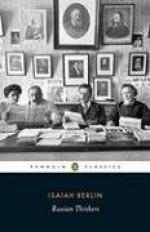
|
| Name: _________________________ | Period: ___________________ |
This test consists of 15 multiple choice questions and 5 short answer questions.
Multiple Choice Questions
1. Whose writings were populists influenced by?
(a) Gogol.
(b) Dostoevsky.
(c) Belinsky.
(d) Herzen.
2. What Keats-like gift did Turgenev have?
(a) Turgenev had a gift for short evocative verse.
(b) Turgenev had a gift for "negative capability."
(c) Turgenev had a gift for writing in Italian.
(d) Turgenev had a gift for making himself popular with peasants.
3. What kind of position has Turgenev's legacy occupied in Russian society?
(a) Turgenev has been turned into a populist hero.
(b) Turgenev has become a model gentleman farmer.
(c) Turgenev was turned into a martyr by the left.
(d) Turgenev has been attacked by all sides of the political spectrum.
4. What has the consensus been about Leo Tolstoy?
(a) That he was really a cleric, more than a novelist.
(b) That he was a brilliant novelist but a bad thinker.
(c) That he was ahead of his time as a thinker.
(d) That he was more of a philosopher than a novelist.
5. What was the intellectual's role in the Populists' view?
(a) Intellectuals should work side by side with workers to undermine the aristocracy.
(b) Intellectuals should give their lives to social reform.
(c) Intellectuals should remain aloof from social transformation.
(d) Intellectuals should disseminate propaganda idealizing peasant communes.
6. How were Tolstoy's early stories received?
(a) They earned him a reputation as a promising writer.
(b) They were banned.
(c) They made him an instant celebrity.
(d) They were not noticed until after his death.
7. How did the government react to Turgenev's death?
(a) The government to drastic precautions over Turgenev's funeral.
(b) The government made sure that Turgenev was buried without fanfare.
(c) The government gave Turgenev a hero's farewell.
(d) The government attacked mourners at Turgenev's funeral.
8. What balance did Herzen strike in his philosophy?
(a) A balance between political engagement and artistic remove.
(b) A balance between social justice and intellectual skepticism.
(c) A balance between living naturally and making art.
(d) A balance between revolutionary activities and aristocratic manners.
9. What were the Russian Populists opposed to?
(a) The inherited privilege of the Russian aristocracy.
(b) Individualism on one hand and authoritarian centralism traditions on the other.
(c) The Europeanization of Russian culture.
(d) Radical and revolutionary organizations that wanted to bring about change through violence.
10. Where was Herzen born?
(a) Pinsk.
(b) Berlin.
(c) Petersburg.
(d) Moscow.
11. Who was Tolstoy's sole close friend?
(a) Chernyshevsky.
(b) Dobrolyubov.
(c) Mikhailovsky.
(d) Fet.
12. When did Tolstoy's reputation change?
(a) In the early 1860s.
(b) In the late 1880s.
(c) In the early 1890s.
(d) In the mid-1870s.
13. Who advocated Russian Populism?
(a) The Second of April Committee.
(b) The Moscow Reform Party.
(c) A widespread group of radicals.
(d) The Petersburg Literary Coterie.
14. What novel did Turgenev publish five years after Fathers and Children?
(a) A Nest of the Gentry.
(b) A Huntsman's sketches.
(c) Torrents of Spring.
(d) Smoke.
15. What quality redeemed the characters based on Belinsky?
(a) Simple kindness.
(b) World-weariness.
(c) Intense moral convictions.
(d) Self-defeating clumsiness.
Short Answer Questions
1. How did the Populists differ from Marxists?
2. Whose failures did the leader of the Populists reject?
3. What sentiment ultimately moved the Populists?
4. According to Berlin, why is there not a good biography of Alexander Herzen?
5. Where did Tolstoy find the source of his philosophy?
|
This section contains 593 words (approx. 2 pages at 300 words per page) |

|




